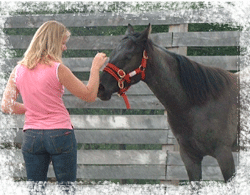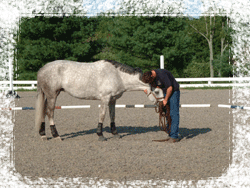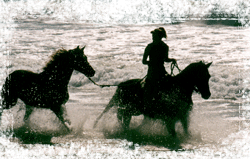LOVE. RESPECT. UNDERSTANDING.
Three powerful words. Some might even argue that these are the most powerful words in the Universe. When we see people who embody these words we often honor them; revere them. They can even inspire us to be more like them in our own lives.
When I was asked to write an article about gaining your horse’s trust my first thought was, "One of the simplest yet hardest things to do. And what makes it hard is not in the horse, but in us." Many times we are so busy, have such time constraints and stressed lives that when we come to our horses, despite our best intentions, we don’t see them. I don’t mean they literally vanish into thin air, but we don’t see the horse in front of us. Instead we see what we project onto them.
We don’t consider who they are, how their day might have been, what they like or dislike, especially if we haven’t had the best of days ourselves. At times we expect our horse to make us feel better; not thinking maybe our horse needs us to brighten his day. In short, we may feel love for our equine partners, we may truly enjoy their company but are we treating them as the living, breathing, conscious beings they are?
As you’ll see, if you want to gain the trust of your horse, if you truly want to create a trust-based partnership with him, then you must put down your "tricks of the trade", stop trying to figure out a fool proof technique and look within you. Love. Respect. Understanding. Give your horse these gifts and your horse will give them right back to you. Here are some ways to do just that and strengthen or begin that bond of trust with your horse as well as some signs that you might just be making some progress:
Build the Bond
Few things will relax you and calm your mind like getting in touch with nature; listening to the stillness, feeling the sun beaming on your skin, the grass between your toes. But we often forget that this is where our horse lives. Every moment is spent being in and being of this natural world. Getting to know your horse in his natural environment is getting to know him. Instead of coming to your horse with your agenda, try coming to him with no agenda, no timeframe. Sit down with him in the paddock. Watch his motions, his emotions, his interactions. Find out who your horse is when he’s not being forced to work. Let your horse discover you on his terms. Allow him to explore you, approach you and greet you in his time.
Saying "Hello"
Have you ever been approached by a boisterous person; loud voice, hard handshake, jumping in your space, demanding your attention? Not a comfortable place for most yet this is often how we greet our horses. We walk up, put a halter on or start touching, petting, grooming, regardless of how the horse feels. Instead, try inviting your horse to the meeting. Notice how your horse reaches out with his nose, as he stretches towards you to discover your uniqueness.
Offering the back of your hand is a great, non-evasive way of reciprocating his approach. Welcome his interest as he begins to touch your skin gently, feeling it with his whiskers. It’s not unusual for him to move to your hair next. With every breath he takes, he is investigating new parts of you. As he gets closer to your neck he begins to exchange breaths with you. Even in this simple greeting, he is learning to trust you and offering you the same.
I’m not "Comfortable" with That
Just as you wouldn’t let another person touch you inappropriately, your horse feels the same way. Ask your horse and let her invite you into her vulnerable areas before you start poking, prodding and rubbing. Get her approval to explore her defenseless areas, then you can scratch her withers, rub her body and search for those special places she likes rubbed. Let her show you. Give her the respect you would want from another. Not only will you introduce yourself, but you’ll be asking your companion to accept you for what you do and not for what you are – a predator. You will also discover her favorite "itchy" areas making that ever important good first impression.
Facial Features
Many horses enjoy human contact, while others learn in time that human contact can be comforting. Here are a few common ways horses enjoy the human touch. Find the ones your own horse enjoys.
Ears – Massage your horse’s ears. Begin at the base of the ear and work your way up to the tip. Find out what he enjoys and build on the positive experiences. Work in a fluid rhythm, creating circular motions or stroking the ears. There are acupressure points at the tips of the ears, which alleviate stress and many horses just melt into instant relaxation.
Eyes – There is a particularly sensitive nerve center located right under the horse’s eye. When you move 2 or 3 pads of your fingers in the direction of the hair line and create small circles, you will find your horse begin to relax. Be cautious not to use your finger tips as you may dig your fingernails into his skin. As you increase the area of the circles you may be able to cover your horse’s eye. By momentarily taking his vision, you ask him to trust in your protection.
Muzzle – Cup your hand over your horse’s muzzle, circle your palm and let him tell you if he likes the cradling feeling or the gentle motion of your hand against his lips. For the more advanced horseman or woman you may wish to place 2-3 pads of your fingers against the top gum, once again circling as you go. Remember to make your way to the front by entering the side of his mouth first. This massage can be very soothing, but be cautions that your horse doesn’t pull your fingers between his teeth. The top lip can be very powerful!
Neck Drops
For the anxious and frightened horse this can be the most difficult request. So if your horse is willing to drop his head for you, you are well on your way to gaining his trust. Asking your horse to drop his head is asking him to give up his primary form of defense – flight. Anatomically horses need their heads up high to focus into the distance. When their head is lowered you remove this ability and ask them to focus on what is on the ground. At that point, their trust has been completely placed into your hands.
As they lower their head for you, they present the most vulnerable part of their body, the back of their neck. This is the exact area where lions would strike to asphyxiate their prey. Some say that crouching down by the side of your horse and encouraging him to lower his eyes below your own takes his trust to an even deeper level.
One way to request a neck drop is to place pressure onto the lead rope underneath the clip. The pressure is very slight, equivalent to holding a baby bird. Notice if your horse responds to a constant pressure of if he prefers a pulsing within the pressure. Either way, remember that horses learn from the release of pressure so your timing in rewarding the tries is crucial to encourage his nose to touch the ground.
Neck Yielding
There are many advantages to neck yielding. Muscle stretches, tissue softness, natural adjustments and preparation for the one-rein stop, just to name a few. One of the greatest advantages is that it builds trust. By asking your horse to softly, smoothly and willingly yield his head around touching your hip bone farthest from his head you take away his vision in one eye.
Horses are known to follow their noses and this tight neck yield prevents an open and immediate flight path. Losing vision will decrease his flight options, a major part of our horse’s survival instinct, and asks him to completely place his trust in you.
Disengaging hindquarters
Consider this from a trust-building standpoint and take a moment to do the following exercise: Stand up. Cross your legs. And, now… run! OK. Now stand up as you probably fell flat on your face. This is exactly what your horse would experience. If you make your horse disengage her hindquarters, you take away her ability to run and instead ask her to look to you for guidance.
Horses gain leadership by controlling one another’s feet, they take possession of territory. In other words if you control her forward motion and direction, you take the leadership role in your herd of two. This of course takes us into another topic, respect, but we shall save that for the next article.
I hope those few tips help to start you on the path of building that trust-based relationship with your horse. Remember, it’s not about developing the right trust building techniques and tricks. Your horse is not a motorcycle that, pushing the right buttons, always goes on your command. He is a living, breathing, being.
Treat him as you would like to be treated. See him for who he is. Be the kind of person your horse can rely on, can trust and you will develop a bond that will never be broken.
|



